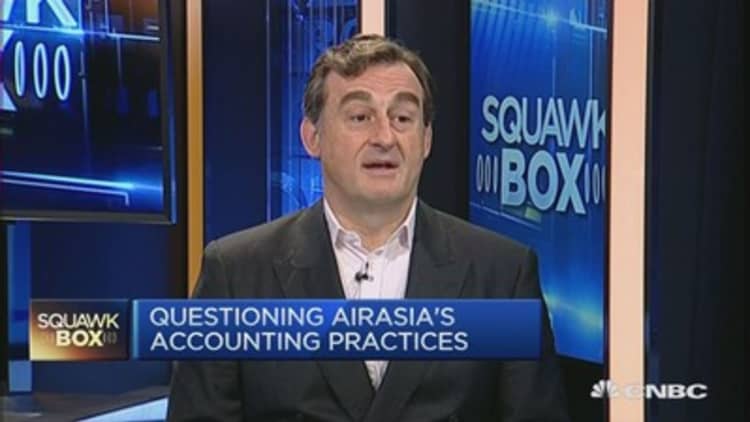
The negative analyst report that sent AirAsia shares into a tailspin finally went into wide release Wednesday, alleging the budget airline needs to raise as much as $1.9 billion to pay down debt.
"AirAsia may be a new dog, so to speak, but it's playing a very old trick," GMT said in the report. The jibe is among a mixed bag of accusations contained in the report, which GMT distributed to clients on June 10, but withheld from the media until June 24.
It primarily accuses AirAsia of "milking" transactions with its money-losing associates in the Philippines and Indonesia, such as plane lease and maintenance deals, to boost the parent's operating cash flow.
Because the associates currently aren't able to pay their bills to the parent, "AirAsia is extending significant capital to them, essentially gearing up, funding its own profits and flattering its operating cash flows," the report said, alleging the carrier is close to default.
Read More Short sellers put AirAsia in the crosshairs
GMT, which calls itself an accounting research firm without a position on the shares, estimates AirAsia will need to raise as much as $1.9 billion via a recapitalization, potentially diluting existing shareholders by more than 100 percent. The parent company is owed around 2.8 billion ($750 million) by its Indonesian and Philippine associates.
GMT advises selling or shorting AirAsia stock, saying its fair value is 1.23 ringgit a share or less.
AirAsia hasn't responded to CNBC's requests for comment.
The stock has certainly reacted to GMT's report since the firm's claims began circulating; shares have dropped more than 26 percent since the beginning of June, at one point touching 1.43 ringgit, the lowest level since 2011. In midday trade Wednesday, the stock is down 1.8 percent at 1.61 ringgit.
In a filing to Bursa Malaysia last week, AirAsia noted that its net gearing level is at 2.47 times, down from 4.2 times a few years ago, adding it's confident of bringing that down to around two times by the end of the year, even without several efforts to raise cash from associates' repayments, sale-and-leaseback transactions and potential sales of other investments.
The carrier also said it plans to raise around $100 million each for the Indonesian and Philippine associates by bringing in new investors via convertible bonds as a lead up to initial public offerings (IPOs) in 2017. It expects both associates to become profitable this year.
Read More Grey skies ahead as AirAsia X eyes US
Other analysts are skeptical of some of GMT's claims. Out of the 23 analysts tracked by Reuters, 17 have buy or strong buy calls on the stock.
"That the AirAsia group is in some kind of trouble cannot be denied," CIMB said in a note last week after the GMT report was released to a select group. But CIMB's base case is that AirAsia will avoid a punishing rights issue by successfully bringing in new investors and securing sale-and-leaseback deals for 16 older planes. It rates the stock at Add, with a 2.26 ringgit target.
GMT is unconvinced by AirAsia's plans to raise funds.
"If they IPO these associates, that's great but these associates will become genuinely independent companies that the central company will not be able to milk for profits," Robert Medd, a partner at GMT, told CNBC.
As AirAsia's ownership stakes in the associates will be reduced, it will have a proportionally lower claim to their profits, Medd explained in a separate phone interview. Independent shareholders will also likely protest what GMT views as excessive payments the associates are making to the parent for related-party transactions such as leasing planes, he said.
GMT said AirAsia doesn't disclose the profit recognized from these transactions, just the revenue. It estimates that AirAsia used these deals to inflate profits by 39 percent over the past five years.
"AirAsia seems to be making more money leasing planes to associates than flying planes around the region," Gillem Tulloch, a partner at GMT, said in a phone interview. "AirAsia should pass the value back to its associates. It doesn't have to take such a large cut."
AirAsia, in its Bursa filing last week, said its income from leased aircraft is not excessive and the margins are "very much in line" with third-party commercial lessors.
The carrier also said that concerns over the leasing profit spurred it to create leasing company Asia Aviation Capital (AAC) in the fourth quarter of last year in order to break out the operation's figures, which were included in its first quarter earnings report. While last week's filing didn't mention GMT, it was widely believed to be in response to the analyst report.
AAC's net profit in the first quarter was reported as $490,000, compared with the parent's first quarter net profit of 149.3 million ringgit ($39.9 million). GMT said not all of the 60 planes being leased to associates have been moved under the AAC umbrella yet and it estimates AirAsia will see around $44 million of profit annually from those deals.
AirAsia has some defenders of its leasing practices.
"AirAsia takes a big balance sheet risk on the aircraft that are used by the associates and is rightfully entitled to earn aircraft leasing profits to offset these risks," CIMB said in its report last week. "If AirAsia had a sinister motive, it would have forced Thai AirAsia to sublease even more aircraft from AirAsia to enable AirAsia to continue earning profits from subleasing the planes but this was not the case after Thai AirAsia's successful IPO in 2012."
—By CNBC.Com's Leslie Shaffer; Follow her on Twitter @LeslieShaffer1


